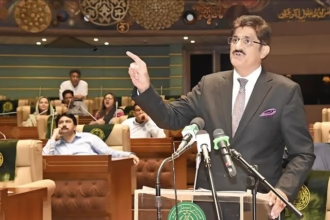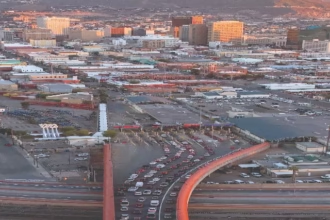For decades, America has prided itself as a land of opportunity—a magnet for dreamers, workers, and refugees. But today, under the aggressive implementation of ICE-led deportations, spearheaded by President Donald Trump’s renewed enforcement drive, the country finds itself fractured. The issue is no longer just about legality—it has become a battleground of narratives, identity, and accountability.
President Trump insists that “millions and millions” of illegal immigrants—whom he categorizes as violent criminals, traffickers, sex offenders, and pedophiles—have “invaded” the U.S. According to him, his administration’s duty is to remove these threats through mass deportations, often carried out with military-style precision. ICE raids in cities like Los Angeles, where five individuals with criminal pasts were arrested on June 7, are presented as success stories. But a deeper question lurks behind these headlines: if such individuals are indeed dangerous and illegal, how did they get into the country in the first place?
As a legal immigrant myself, my family and I embarked on a long and arduous journey. We applied in 2007 for family-sponsored immigration and were not approved until 2024. Seventeen years of background checks, verification of employment, travel history, character assessment, and criminal records—all under the scrutiny of U.S. immigration services. It is a stringent, sometimes grueling, system that leaves little room for error. If followed diligently, it is almost impossible for someone with a dubious past to pass through.
This raises troubling questions. How do individuals with criminal records—those labeled as drug dealers, violent offenders, or sex criminals—make it into the U.S. undocumented? What loopholes exist? And more importantly, who allowed it?
Beyond bureaucratic lapse, another profound and often overlooked truth must be acknowledged: every wave of immigration has often been triggered by destruction caused by the United States and its allies. The Syrian crisis, spurred by U.S.-led regime change attempts, created millions of refugees—many welcomed into the United States. The U.S. invasion of Iraq unleashed chaos, civil war, and displacement, compelling thousands of Iraqis to seek shelter abroad. Libya, after being bombed into anarchy, witnessed similar refugee outflows. Palestinians displaced by decades of unending Israeli occupation, often with U.S. political and military backing, have also found refuge in America. The collapse of Afghanistan after two decades of NATO occupation led to a mass exodus—especially of Afghans who worked with Western forces. Most arrived with no paperwork or formal identity verification, given the country’s primitive recordkeeping systems. Yet, many were fast-tracked into the U.S., bypassing the very scrutiny imposed on legal immigrants from stable nations.
This uncomfortable truth demands moral clarity: if undocumented immigrants are subject to the full weight of the law, then those policymakers and officials who created the conditions for their displacement, or allowed their entry without due diligence, must also be held accountable. It is a shared responsibility—one that begins not at the border, but in the war rooms and foreign policy chambers where these crises were ignited.
There appears to be no structured inquiry or investigation into the root causes. No commissions, no accountability frameworks to identify the officials, agencies, or politicians who enabled mass illegal entry. Immigration enforcement in the U.S. has historically vacillated depending on who is in power. One administration turns a blind eye, quietly encouraging mass entry. The next tries to reverse it through high-profile crackdowns. But in the absence of institutional accountability, this cyclical dysfunction persists—feeding public anger and polarizing communities.
ICE is now being weaponized not just to remove the undocumented, but to reassert political dominance. The use of unmarked vehicles, masked officers, and sudden, forceful detentions—often in front of children and elders—conveys a message of fear. It is not surprising that over 10,000 protesters recently marched through downtown Los Angeles against these raids. Many carried Mexican flags—none carried the American flag. This wasn’t just a protest; it was a symptom of deeper social unrest.
Critics argue that these ICE actions, while legal under the Supreme Court’s allowance of 24-hour deportation notice, are being carried out in a manner that undermines constitutional due process. Rights of asylum seekers, refugees, and even undocumented residents with long-standing ties to communities are brushed aside in the name of executive orders. A nation built by immigrants is now turning its state machinery against them.
Supporters of Trump’s policy, on the other hand, insist that deporting illegals—especially criminals—is not just constitutional, but necessary. They point to the Clinton-era deportations of over 12 million people, Obama’s deportation of 5 million, and Bush’s expedited removal protocols. “This is not new,” they argue. “It’s enforcement overdue.”
But many dissenters challenge this logic. They argue that Trump is not fixing immigration—he’s weaponizing it. He’s framing all undocumented migrants as threats, fueling fear for political gain. His critics claim that this dehumanization is less about justice and more about re-election. Trump’s rhetoric plays to a base who feel left behind—using immigrants as scapegoats for economic and social frustrations.
This divide is not only ideological—it’s generational, racial, and geographic. Many immigrants, including legal ones like myself, find ourselves in a complicated space. On one hand, we support the rule of law. On the other, we reject the vilification of all migrants and the blanket criminalization of entire communities.
Let us remember: America is a nation of immigrants. Even Donald Trump is the grandson of Friedrich Trump, a German immigrant who arrived in the U.S. in 1885. The German Chancellor once presented Trump with his grandfather’s immigration file during a White House visit—a reminder that no one, not even the president, is far removed from the immigrant experience.
The real issue is not race, religion, or ethnicity. The only legitimate distinction should be between legal and illegal entry. But even that must be addressed humanely, within the framework of rights and due process. It cannot become a pretext for racial profiling, family separation, or fear campaigns.
The lack of systemic accountability is the root of this chaos. Who failed to enforce border laws? Who allowed the lapse? Was it intentional? Was there bribery? Was it negligence or political strategy? These are the questions no one in Washington wants to answer.
The consequences of this negligence go beyond borders. As seen in the Los Angeles protest, foreign governments—like Mexico—may begin to leverage their diaspora as political tools. If unchecked, this tactic could be replicated by other countries, introducing a dangerous element of foreign interference in domestic American affairs.
In my observation of reactions on X (formerly Twitter), two dominant narratives have emerged: one, defending ICE’s actions and Trump’s policies as lawful and overdue; the other, denouncing the excessive force and racial undertones as unconstitutional and inhumane. Some comments suggest this is less about criminals and more about silencing immigrants—legal and illegal alike—through fear and exclusion.
What, then, is the way forward?
First, no society or country elsewhere in the world may be destroyed, and no country, especially one as powerful as the United States, should ever tolerate illegal immigration. The law must be upheld. But enforcement must be precise, proportional, and humane.
Second, there must be rigorous accountability. Politicians, departments, and border enforcement agencies that failed in their duty must face consequences. Only then can the system regain public trust.
Third, investment must be made into technology, manpower, and processes that make it virtually impossible for undocumented migrants—especially those with criminal records—to enter undetected. The U.S. has done this before during the post-9/11 anti-terrorism era. It can do it again.
This is not just about protecting borders. It’s about preserving the spirit of America—a land where laws are enforced, but justice is never blind to humanity. If illegal immigration is the dragon, it must be slain at its roots. Not with brutality, but with policy, accountability, and moral clarity.
Let us hope that sanity prevails. Let us hope that the United States rises above political theatrics and embraces a model of immigration that is lawful, just, and worthy of the ideals it claims to defend.









